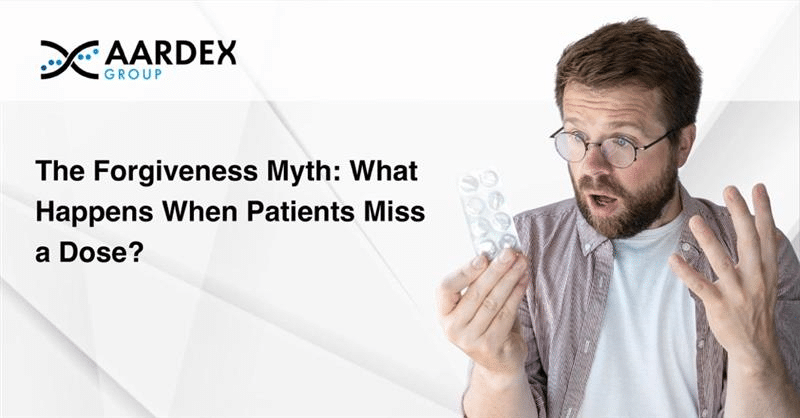The perfectionists among us might outwardly disagree, but, in truth, even they would secretly admit that it is not possible to live a life free from mistakes. We are complex beings living and working in complex environments and, therefore, we will always be prone to occasionally getting things wrong. After all, to Err is Human.
But mistakes often have consequences. In medicine, the presence of human error can have negative and potentially dangerous impacts for patients. Take the seemingly innocuous example of missing a dose of a prescribed drug. It’s a mistake made by many people the world over on a daily basis, but one where the consequences can vary greatly according to a variety of different factors. In the case of treating an infection with antibiotics, a fall in drug concentration levels can lead to symptoms returning and the need for a renewed treatment plan. In the case of chronic conditions such as hypertension or diabetes, a similar situation can introduce serious risks, including stroke and heart attack. For people with epilepsy, it can raise the chances of having a seizure. Those suffering from mental illnesses can be prone to symptoms of Antidepressant Discontinuation Syndrome (ADS).[1],[2],[3]
These cases highlight why missed doses can require the input of a healthcare professional (HCP) to advise on the best course of action for the patient concerned, considering their overall health and the risks associated with either taking the dose late or accepting that the dose has been missed entirely.
When doses are missed, the obvious result is that the levels of drug in the body are reduced, compromising the level of protection offered in the short term and/or reducing the effectiveness of a longer-term treatment schedule. This is particularly the case for treatments with a shorter half-life, which offer a narrower therapeutic window. Meanwhile, where patients compensate for a missed dose by ‘catching up’ at a later point in time, the desired continuity of drug action is disrupted and concentration levels can be raised excessively. While this can negatively impact on therapeutic effects, the patient might in fact present as fully adherent if their ‘clustered’ dosing behaviour is averaged out over time.
A major influence on the potential harm caused is dosing frequency. As the gaps between doses increases, the consequences of missing a dose are likely to grow in seriousness. For example, if the regimen dictates twice-daily dosing, then a single missed dose is, in many cases, unlikely to cause severe problems. Likewise, taking two doses closer together than prescribed in order to catch up is unlikely to result in harmful overdosing. Effectively, the dose is set at a frequency and concentration that allows the patient to be forgiven for their non-adherence. However, under commercial pressure, dosing regimens designed for BID twice daily administration are often stretched to QD, every day, reducing forgiveness and making each missed dose critical. This hasbeen the case with several antihypertensive drugs and oral anticoagulants. Today, this decrease in forgiveness forgiveness becomes even more critical, when dosing intervals are extended to weekly, monthly or potentially even longer. In these situations, adherence to the regimen becomes more critical to positive patient outcomes in terms of maintaining desired clinical effects or avoiding peaks/troughs.
In light of this situation, and with human error making poor adherence a regular occurence, a logical question arises: why do drug regimens not default to a higher dosing frequency to accommodate patient mistakes? Here, again, adherence is the driving force. Particularly for those suffering from chronic conditions, less frequent dosing is judged to reduce the burden associated with potentially complex, multi-drug regimens. Simplicity and convenience, in theory, means patients are supported in improving their adherence.
Of course, such issues are made less relevant in a world where healthcare professionals can be confident that patients simply take the prescribed medication regimen as instructed. Indeed, the study points to the effectiveness of electronic monitoring feedback interventions in achieving this goal. Drawing on event-monitoring medication technologies allows HCPs to review personal dosing histories, isolate instances of poor adherence, and collaboratively devise strategies for improving compliance.
But even so, it is likely that non-adherence will remain, placing the spotlight on the notion of forgiveness when it comes to missed dosing. In the current development mindset, there is tacit acceptance that patients will leave gaps in their dosing history, and that those behaviours can be compensated for through elevated levels of drug per dose. This can be seen in the fact that GLP-1 treatments can achieve 80% of the effect by only taking one dose out of two[4] But there are obvious implications here, not only in terms of a higher cost per dose, but also, more crucially, of a higher risk that patients will inadvertently experience harm through excessive dosing.
In this imperfect situation, it is clear that ongoing monitoring and adjustment presents an ideal model for optimising adherence, enhancing treatment effectiveness and delivering the positive outcomes that clinicians are striving towards on behalf of their patients. And where such pro-adherence measures are not yet employed, there is a strong argument for a recalibration of current thinking around dosing frequency and forgiveness in light of the real-world behaviours of fallible patients. Extended intervals of stronger drugs might increase convenience and, in theory, adherence, but when combined with dosing errors they also introduce greater risk of treatment disruption and overdosing. Simply put, we must acknowledge that adherence might not align precisely with the prescribed regimen, but we must balance that with careful consideration of how such deviations are accommodated and to what extent they should be tolerated. We know to err is human, but perhaps we should also remember that forgiveness is not always divine.
Establishing hard evidence for your trial…
AARDEX has a best practice methodology, independent of any device package or software platform. Utilising our expertise and experience in medication adherence and patient compliance we acquire, monitor, analyse, guide and interpret data to deliver absolute clarity and bring confidence to sponsors, trialists, and ultimately, patients.
AARDEX is the only mature, robust and proven adherence solution on the market today, one that maximises the reward, mitigates the risk and delivers resolution for your clinical trial. All delivered with the clarity, integrity and certainty you need to proceed with complete confidence in the exposure-response.
[1] https://www.webmd.com/drugs/stop-skipping-medication
[2] https://www.epilepsy.com/what-is-epilepsy/seizure-triggers/missed-medicines
[3] https://www.verywellmind.com/why-do-i-feel-bad-if-i-miss-a-dose-of-my-antidepressant-1067630



